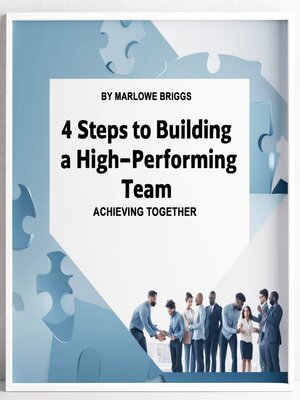4 Steps to Building a High-Performing Team
audiobook (Unabridged) ∣ Achieving Together
By Marlowe Briggs

Sign up to save your library
With an OverDrive account, you can save your favorite libraries for at-a-glance information about availability. Find out more about OverDrive accounts.
Find this title in Libby, the library reading app by OverDrive.



Search for a digital library with this title
Title found at these libraries:
| Library Name | Distance |
|---|---|
| Loading... |
This audiobook is narrated by a digital voice.
Trust forms the bedrock upon which all high-performing teams are built. Without it, even the most talented individuals will struggle to work cohesively toward common goals. The challenge for leaders and team members alike is understanding that trust is not merely given or assumed—it must be deliberately cultivated, nurtured, and maintained through consistent actions and behaviors.
The journey toward building trust begins with vulnerability. When team members feel safe to express their thoughts, concerns, and ideas without fear of judgment or retribution, they create an environment where authentic collaboration can flourish. This vulnerability is not weakness; rather, it represents the courage to be genuine and transparent with one's colleagues. Leaders must model this behavior first, demonstrating that it is acceptable and even encouraged to admit mistakes, ask for help, and acknowledge areas where improvement is needed.
Psychological safety serves as the cornerstone of this trust-building process. Research has consistently shown that teams with high levels of psychological safety outperform their counterparts across virtually every metric. When individuals believe they can speak up, take calculated risks, and contribute their unique perspectives without facing negative consequences, they become more engaged, creative, and committed to the team's success. This safety is established through small but significant actions: acknowledging contributions, responding thoughtfully to questions, and addressing conflicts constructively rather than avoiding them.







